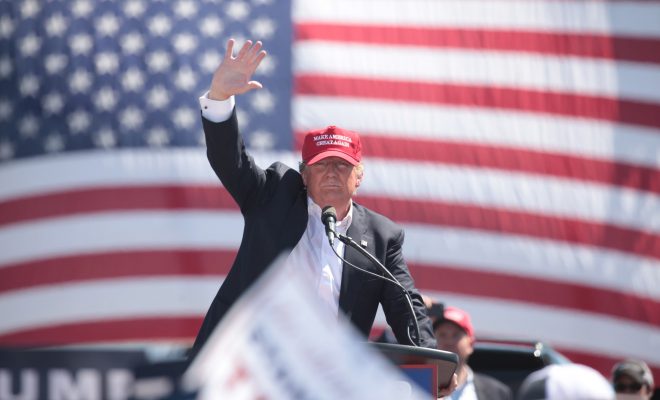 "Donald Trump" Courtesy of [Gage Skidmore via Flickr]
"Donald Trump" Courtesy of [Gage Skidmore via Flickr]
Elections
Trump Vows to ‘Destroy’ ISIS, Use ‘Extreme Vetting’ on Immigrants
Under a President Trump, American foreign policy would look something like this: Guantanamo Bay would remain open. Drone strikes would continue. Nation building and regime change would cease. And–in what Trump referred to as “extreme vetting” in his foreign policy speech Monday afternoon–immigrants from regions of the world that have a “history of exporting terrorism” will be subject to screening tests.
At Youngstown State University in Youngstown, Ohio, Trump, the Republican presidential nominee, highlighted America’s threats–and criticized the architects of its current foreign policy–before revealing the tenets of his foreign policy plan. With broad strokes, he painted a bleak portrait of an America under siege from “radical Islamic terrorism,” a phrase he used often and pointedly in his speech. He derided President Obama’s and then Secretary of State Hillary Clinton’s approach to the Middle East as a failure. “The rise of ISIS is the direct result of policy decisions made by President Obama and Secretary Clinton,” Trump said, pointing to decisions made in Libya, Syria, and Iraq that led to the region’s current instability, allowing ISIS to prosper.
That speech was a reminder that Prompter Trump will always be just as dishonest and incompetent as Twitter Trump.
— Jon Favreau (@jonfavs) August 15, 2016
The Cold War was a consistent reference point throughout his speech, as Trump sought to parallel the idealogical threat of radical Islam with that of communism. “Our victory in the Cold War relied on a bipartisan and international consensus,” Trump said. “That is what we must have to defeat Radical Islamic terrorism.” And in a surprising backtracking of his previous remarks that called into question NATO’s effectiveness, Trump said under his administration, America will “work closely with NATO.” He added that “we could find common ground with Russia in the fight against ISIS.”
And in a move he has alluded to in past interviews, Trump called for an “ideological screening test” that would root out “all members or sympathizers of terrorist groups.” In addition, such a test would screen out those who “believe that Sharia law should supplant American law;” “Those who do not believe in our Constitution;” and those who “support bigotry and hatred.” Specifically what such a test would look like, to whom it would be distributed, and how it would be administered was not expounded upon.
Trump ends his hateful, bigoted, fear-mongering speech promising…to reject bigotry & hatred. No self-awareness or sense of irony. Amazing.
— Wajahat Ali (@WajahatAli) August 15, 2016
Trump’s speech–which was precluded by remarks from former mayor of New York City Rudy Giuliani and Trump’s running mate Gov. Mike Pence (R-IN)–focused exclusively on the threat of “radical Islamic terrorism.” He did not mention China, North Korea, or Russia, three nations that many foreign policy analysts see as some of America’s gravest threats apart from ISIS and other terrorist groups.
Though his speech mirrored the apocalyptic tone of the speech he delivered a few weeks ago at the Republican National Convention, he sought to end it on a cheery, unifying note: “I will fight to ensure that every American is treated equally, protected equally, and respected equally,” he said. “Only this way will we make America great again and safe again for everyone.”








Comments